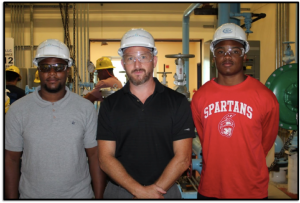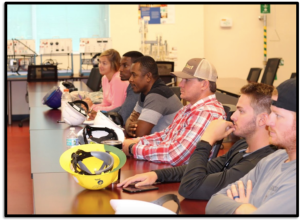

The high percentage of students who succeeded in the contextualized remedial math course that the Regional Center for Nuclear Education and Training (RCNET) created for students in the electric power technology program at Indian River State College (IRSC) has led college leaders to broaden its reconfiguration of college-level algebra.
This fall 150 engineering technology students—most of them new to the program at the Fort Pierce, Florida, community college—will take the redesigned math course that teaches trigonometry, statistics, and algebra in the context of STEM technician careers. The new course replaces the college-level algebra course that has historically stymied students, particularly African-American males.
“This is one of the few things that has moved the needle,” said Kevin Cooper, referring to the increase in enrollment and persistence of minority students in the electric power technology program at IRSC. Cooper is principal investigator of RCNET and assistant dean of Advanced Technology at IRSC. Before a highly engaged audience of 50 educators, Cooper talked about how to eliminate math as a barrier to entry and success in technical fields on July 25 at the High Impact Technology Exchange Conference (HI-TEC) in Miami, Florida.
Cooper, an RCNET industry partner, and students talk about the contextualized math course in this video: https://www.youtube.com/watch?v=cU5aUQZN73M
The curriculum for a new college-level algebra course that Cooper developed with support from RCNET’s Advanced Technological Education (ATE) grant from the National Science Foundation simultaneously echoes traditional technical math and incorporates skills that IRSC’s industry advisors and other ATE principal investigators have identified as essential for the STEM technical workforce.
Five of the 14 colleges that participated in RCNET’s professional development for contextualized math during 2017 are launching new courses this fall too. Altogether the pilot tests at IRSC and the five other colleges have involved 200 students already. Cooper reports that minority enrollment in those programs has increased from 10% to 30%.
RCNET will offer its “Eliminating Math as a Barrier to Entry and Success” two-day, professional development workshop again this fall on September 13 to 15 in Orlando, Florida, and on October 11 and 12 in Fort Pierce, Florida.
IRSC's “Triage” Approach
IRSC used the following “triage” approaches in the first two iterations for the nuclear technology program and plans to incorporate them in the new credit course for engineering technology students:
- Students from underserved populations were recruited and placed in “a custom block cohort” for the contextualized math course despite their low scores on math placement tests. The same math instructor taught the cohort over two sequential semesters and embedded nuclear energy concepts into lessons that brought students’ math skills “up to speed” while they took other courses in the A.S. degree program.
- Each student signed a memorandum of understanding agreeing to attend tutoring in the college’s lab twice a week and to have his or her math progress monitored by a program coordinator.
- The instructor took into consideration each student’s preferred learning style.
- Nuclear industry representatives talked to students on the first day of class about the importance of math in keeping nuclear energy environments safe and explained the career opportunities the students would have upon graduation.
In 2016 the first cohort of 12 IRSC students included nine African American students. In spring 2018, 11 of the 12 students—including three who had previously failed Intermediate Algebra twice—graduated from IRSC with A.S. degrees in electric power technology having earned Bs or better in all their classes. The twelfth student struggled early on in all the courses and transitioned into the welding program.
In fall 2017 a cohort of 17 students successfully completed the contextualized math course; 15 are on track to graduate in spring 2019.
Data Drives Math Reconfiguration
At the 2018 HI-TEC Conference, Cooper explained that data from multiple previous RCNET initiatives led to the math reconfiguration. When he and his colleagues looked at data from the program’s screening tests they found that African Americans consistently scored well enough on mechanical aptitude test to qualify for the nuclear technician and other energy-related programs, but did not do well enough on the math exams to qualify for admittance. In the past, students’ test scores had to show that they were “ready” to take college-level algebra or they had to have already passed this course to be accepted in the program.
“We were hurting ourselves by not letting them in the program,” Cooper said. After checking into why college-level algebra was a gatekeeper course he determined it was an artificial legacy, not based on any state education or accreditation standard. “It was not something that’s real. It’s not something that it exists. It’s just something that we created in our heads that you had to have college algebra,” Cooper said.
“They are as qualified as any students we’ve ever had,” Cooper said, referring to the students in the two test cohorts.
“Using the triage approach and eliminating college algebra as an entry requirement, we actually increased minority enrollment,” Cooper said.
RCNET Seeks to Replicate Success
RCNET is now focused on replicating the program for other STEM technician career paths. “It works,” he said.
The success of the pilot courses in energy technology led Cooper and his IRSC colleagues to analyze the math requirements for other programs. They conducted a “360-analysis” during a two-day gathering with representatives from 11 colleges, seven ATE centers, and eight industry partners.
The meeting participants concluded that “college algebra no longer met the 21st century industry math need. Specifically, because of the transition to a data-driven workforce, it was recognized that aspects of algebra, trigonometry, and statistics would make a better math foundation.
“From this outcome, a focus group of industry and academics redesigned [the] math’s course learning outcomes and level of expertise, and a new math course was designed to be launched in the fall 2018 for IRSC’s entire engineering technology department.”Cooper reported in his Creating a Multi-Disciplinary Workforce report.
Depending on results with all the engineering technology students, IRSC may redesign the math courses for its computer science, drafting, and design programs.
 Subscribe
Subscribe


 See More ATE Impacts
See More ATE Impacts
Comments
There are no comments yet for this entry. Please Log In to post one.